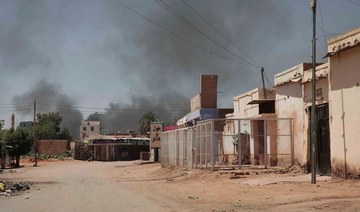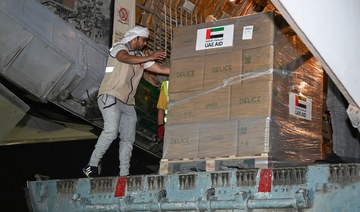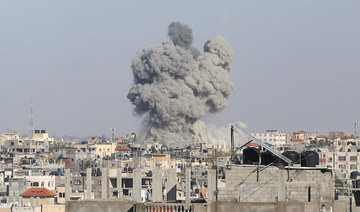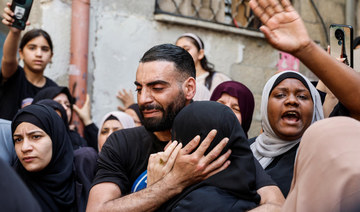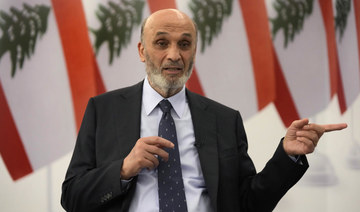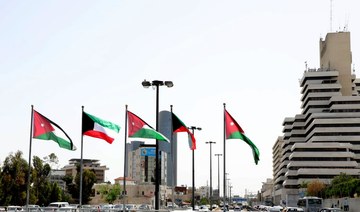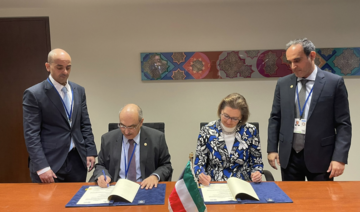PORT SUDAN, Sudan: The UN’s humanitarian chief arrived in Sudan’s main seaport on Wednesday, as thousands of Sudanese and foreign nationals gathered there in hopes of fleeing the conflict-torn east African country.
Martin Griffiths, the under-secretary-general for humanitarian affairs and emergency relief coordinator at the United Nations, tweeted that he came to affirm the UN’s commitment to the Sudanese people. His arrival in Port Sudan on the Red Sea came on the last day of a shaky truce, meant to expire at midnight, which has not quelled the fighting.
There are also increasing concern about the humanitarian situation for those trapped and displaced by the fighting — the result of a power struggle between the country’s two top generals — but questions remain over how UN agencies can operate with limited staff and supplies amid the chaos.
More than a week after the brutal fighting erupted in the country’s capital on Khartoum on April 15, thousands of UN workers were evacuated in a convoy to Port Sudan. Some UN offices paused their services, such as the World Food Program, after two of its workers were killed in fighting in southern Sudan. The WFP has since said it will resume operations.
The battle for control of Sudan erupted after months of escalating tensions between the military, led by Gen. Abdel-Fattah Burhan, and a rival paramilitary group called the Rapid Support Forces, commanded by Gen. Mohamed Hamdan Dagalo.
At a virtual news conference from Port Sudan, Griffiths said he is seeking guarantees from the warring sides for the safe passage of humanitarian aid. He addressed criticism that the UN had not been doing enough by saying it was “extremely difficult” to work in Sudan. Even before the fighting erupted last month, Sudan was a country where one third of the population relied on humanitarian assistance.
Six trucks belonging to the World Food Program carrying aid to the western region of Darfur were looted on the road, Griffiths said, and singled out Darfur and Khartoum as badly in need of assistance.
“It’s not as if we’re asking for the moon,” Griffiths said in the online briefing. “We’re asking for the movement of humanitarian supplies and people. We do this in every other country, even without cease-fires.”
The conflict has so far killed 550 people, including civilians, and wounded more than 4,900. The fighting has displaced at least 334,000 people inside Sudan, and sent tens of thousands more to neighboring countries — Egypt, Chad, South Sudan, the Central African Republic and Ethiopia, according to UN agencies.
More than 42,000 Sudanese who fled the war in their country have crossed into Egypt along with 2,300 foreign nationals since the crisis began, according to the UN refugee agency. Aid workers are increasingly concerned about lack of basic services in these areas, and also in Port Sudan, some 400 kilometers (250 miles) from Khartoum.
Many Western countries have completed evacuations for their citizens from the country, with France, Britain and now the United States using Port Sudan as a base for those looking to leave. But citizens of other nations are still struggling to find a way out.
An estimated hundreds of Syrians, who came to Sudan fleeing their own country’s civil war over the past decade, are among the last foreigners to leave.
Tariq Abdel-Hameed, a Syrian in Port Sudan, said a second Damascus-bound flight with a around 200 Syrians mostly pregnant women and sick people, is scheduled to take off from Port Sudan later Wednesday.
He said the first flight landed in the Syrian capital early Wednesday, with some 200 people, including 21 children, on board. He said more flights are scheduled in the coming days.
For thousands of Sudanese and foreigners flocking to Port Sudan, it’s the last stop before leaving the country. Saudi warships have been ferrying mainly foreigners but also dual Sudanese nationals and others across the Red Sea to the Saudi city of Jeddah.
“It feels really sad to be leaving behind a part of your life,” said Saadiya Abdulrahman, a Sudanese-American woman from Khartoum, while waiting with her daughter for their turn to board a Saudi vessel on Tuesday night. When their turn came, the two first boarded a tugboat with dozens of others, to take them to the Saudi ship.
“Khartoum has become like a ghost town in some neighborhoods because of all the destruction,” said Salah Suleiman, a Sudanese from Khartoum who was among those sailing to Jeddah.
On Wednesday, the fighting continued in and around the Sudanese capital. Clouds of smoke were seen over areas of active fighting, and residents-hiding in their homes-still heard sounds of explosions, with the battles still seemingly centered around key government buildings, such as the Presidential Palace.
There were increasing signs of lawlessness in many of the city’s neighborhoods, with reports that more diplomatic facilities were being targeted. Armed men stormed the building housing the office of Saudi Arabia’s cultural attaché in Sudan, the kingdom said Wednesday.
A statement on the state-run Saudi Press Agency said an armed group “destroyed equipment and cameras, seized some of attaché’s property and disrupted the attaché’s systems and servers.”
Speaking from Kenya, UN Secretary-General Antonio Guterres said the international community needs to come together and put pressure on the warring Sudanese generals to end the conflict.
“All need to use their capacity to put pressure for this horrible and I’d say unjustifiable conflict to stop,” he said. “The present situation is totally unacceptable.”
UN humanitarian chief in Sudan, seeking guarantees on aid
https://arab.news/wnwht
UN humanitarian chief in Sudan, seeking guarantees on aid
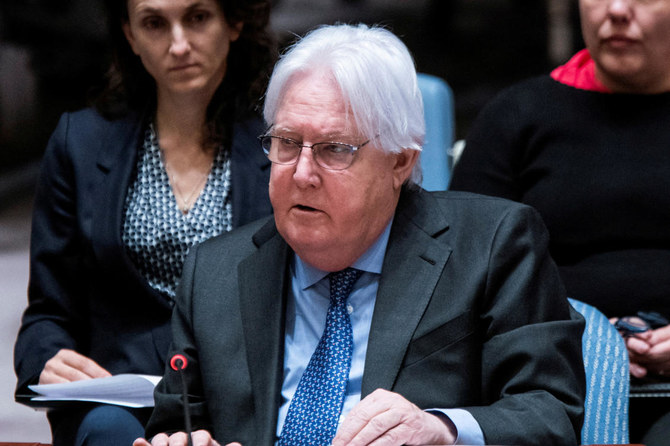
- More than a week after the brutal fighting erupted in the country's capital on Khartoum on April 15, thousands of UN workers were evacuated in a convoy to Port Sudan
- Some UN offices paused their services, such as the World Food Program, after two of its workers were killed in fighting in southern Sudan
Orders to evacuate Rafah ‘inhumane,’ may amount to war crimes: UN human rights chief
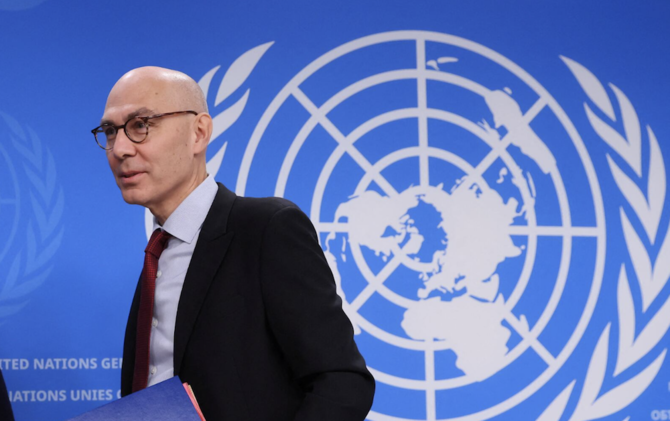
- Volker Turk: New offensive would exacerbate civilian deaths, suffering beyond ‘already unbearable levels’ — According to UNICEF, children account for half of the more than 1.2m people sheltering in Rafah
NEW YORK: UN human rights chief Volker Turk on Monday warned that Israel’s orders for Palestinians to vacate parts of Rafah ahead of a new offensive there would only exacerbate civilian deaths and suffering beyond “already unbearable levels.”
He added that such actions could constitute war crimes, and lamented that months of “relentless strikes” by Israel across the enclave have left no other location except Rafah with the infrastructure and resources to host the mass displacement of more than 1.2 million Palestinians.
Sheltering in tents and overcrowded schools in Rafah, they are now being instructed to move to Al-Mawasi, an area that is already overcrowded and lacking essential services.
Turk said the Israeli orders to relocate Palestinians are “inhumane” and risk exposing them to further danger and misery. Such actions “can sometimes amount to a war crime,” he added.
“Gazans continue to be hit with bombs, disease, and even famine. And today, they have been told that they must relocate yet again as Israeli military operations into Rafah scale up,” Turk said. “This is inhumane.”
The UN Office for the Coordination of Humanitarian Affairs on Monday said a mass evacuation on this scale “is impossible to carry out safely.”
OCHA added that the area of Rafah under evacuation orders covers more than 30 sq. km. There are nine sites sheltering displaced people in the area. It is also home to three clinics and six warehouses.
As of today, more than three-quarters of the Gaza Strip are under evacuation orders.
OCHA said any full-scale incursion into Rafah would push displaced Palestinians “past their breaking point,” and would cripple the already very fragile humanitarian operation there.
It added: “The UN is not taking part in involuntary evacuations or in the setting up of any displacement zones in southern Gaza.”
According to UNICEF, children account for half of the more than 1.2 million people sheltering in Rafah.
In a statement on Monday, the agency called for children not to be forcibly relocated, saying there is nowhere safe for them to go.
UNICEF said potential evacuation corridors are likely mined or littered with unexploded ordnance, and shelter and services in areas for relocation are likely to be limited.
Turk stressed that international humanitarian law prohibits ordering the displacement of civilians for reasons related to the conflict unless the security of civilians involved or “imperative military reasons so demand,” and even then subject to strict legal requirements.
“Failure to meet these obligations may amount to forced displacement, which is a war crime,” the office of the UN High Commissioner for Human Rights said in a statement.
“Forcibly relocating hundreds of thousands from Rafah to areas which have already been flattened and where there is little shelter and virtually no access to humanitarian assistance necessary for their survival is inconceivable. It will only expose them to more danger and misery.”
On Monday, Israel carried out airstrikes on Rafah, killing at least 26 Palestinians, most of them women and children.
Also on Monday, two crossings into Rafah were closed, completely disrupting the already meager flow of humanitarian assistance.
“More attacks on what is now the primary humanitarian hub in the Gaza Strip are not the answer,” said Turk.
“The lessons of the past seven months of conflict in Gaza are clear — with women and children making up over 70 percent of the more than 120,000 killed, wounded and missing. Enough of the killing.”
Turk reiterated the urgent need for a ceasefire and unhindered, at-scale flow of humanitarian aid into Gaza.
He also called for the immediate release of hostages held by Hamas, and of Palestinians arbitrarily detained by Israel.
Palestinians in the West Bank pushed to the brink as Israeli assault on Gaza keeps tensions high
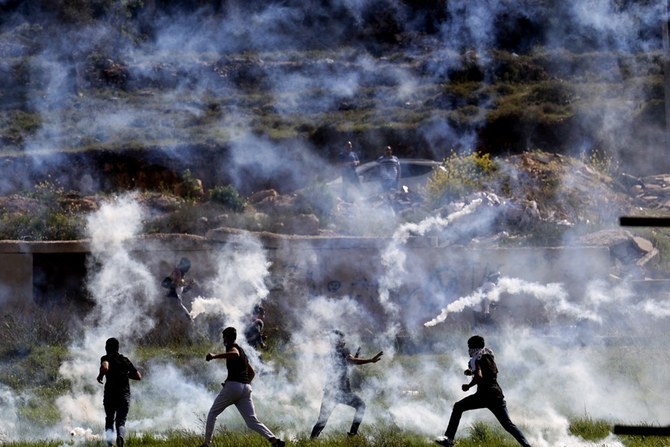
- Jewish settlers in the West Bank together with Israeli troops ramp up hostilities against Palestinians, especially rural communities in Area C
- Attitude of Israeli authorities blamed for emboldening violent Jewish settlers to attack and expel Palestinians from the West Bank with impunity
LONDON: Shockwaves from Israel’s military operation in Gaza have reverberated into the West Bank and East Jerusalem, where security forces and emboldened Jewish settlers have reportedly ramped up attacks on Palestinian communities.
Since the Oct. 7 Hamas-led attack sparked the conflict in Gaza, Israeli settlers have carried out 603 attacks against Palestinians in the West Bank, expelling 1,222 people from 19 herding communities, according to UN figures.
Armed settlers have also killed at least nine Palestinians, while Israeli security forces have killed 396 others in the past few months.
Likewise, the Israeli army has intensified raids. On May 4, Israeli forces raided Tulkarem and killed five Palestinians, including four Hamas members. On April 20, Israeli forces carried out a raid in the same governorate, home to more than 6,400 refugees, killing 14 Palestinians.
Abeer, who runs a small business in Jenin, has observed a “surge in settler attacks, the proliferation of checkpoints, daily raids on Palestinian homes, infrastructure destruction, killing of Palestinian youths, and increased Israeli military airstrikes.”

While similar attacks regularly took place before Oct. 7, she told Arab News that “they have doubled and become more horrific” since the onset of the Gaza war.
Jenin “has for about two years been specifically a target for the Israeli military, as it’s home to a few resistance groups,” she added.
According to a report by the UN Human Rights Office published in March, the “drastic acceleration” of long-standing patterns of discrimination, oppression, and violence against Palestinians has pushed the West Bank to the “brink of catastrophe.”
Israel, at “one of the fastest rates on record,” has demolished 917 Palestinian-owned structures in the West Bank since Oct. 7, displacing 1,015 Palestinians. Of these structures, 210 are in East Jerusalem and 285 are residential buildings, the report added.
Yasmeen El-Hasan, international advocacy officer at the Union of Agricultural Work Committees, a nongovernmental organisation supporting rural Palestinian communities, described the situation in the West Bank as “absolutely horrendous.”
“The Israeli expansion of its settler colonial enterprise in the West Bank is happening parallel to the genocidal war on Gaza,” she told Arab News.
“The occupation has established numerous new settler outposts, settler roads within the West Bank,” she said, adding that the Israeli government “has approved thousands of new settler units within the West Bank.”

While casualties from Israeli violence in the West Bank have not reached the scale of those in Gaza, she said the “intensity of Israeli settler colonial violence in every part of historic Palestine has amplified, increased, been exacerbated in the past six months.”
The “impunity” granted by Israeli authorities has further emboldened Jewish settlers in the West Bank, El-Hasan said.
Settlers attacking Palestinian communities are “increasingly armed by the government of the Israeli occupation and there are no consequences for what they’re doing,” she said.
Addressing the 55th session of the Human Rights Council in March, Nada Al-Nashif, the UN deputy high commissioner for human rights, said that after Oct. 7, the OHCHR documented “cases of settlers wearing full or partial Israeli army uniforms and carrying army rifles, harassing and attacking Palestinians, including shooting at them at point-blank range.”
She also said that by Oct. 31, Israeli security forces had reportedly distributed about 8,000 weapons to “settlement defense squads” and “regional defense battalions” in the West Bank.
INNUMBERS
• 700,000 Israeli settlers in the West Bank and East Jerusalem.
• 300 Illegal settlements or outposts on Palestinian territory.
Source: OHCHR
An incident in which the Israeli military purportedly enabled settler violence took place in mid-April, when about 50 settlers attacked the northern West Bank village of Aqraba “protected by the Israeli occupation army,” according to WAFA, the Palestinian news agency.
Two Palestinians were killed in the settler attack, according to the mayor of the village, Salah Bani Jaber, who witnessed the incident. He said the Israeli soldiers at the scene “stood idly, watching the settlers.”
“The absence of accountability for settler violence is a key factor in the ongoing coercive environment,” Al-Nashif told the president of the UN Human Rights Council.

She described this lack of accountability as a “manifestation of a dual system of criminal justice that has had discriminatory effects on Palestinians.”
Yesh Din, an Israeli NGO that documents abuses by Israeli civilians against Palestinians in the occupied territories, concluded in its December data sheet that “the Israeli-law enforcement system fails in fulfilling its duty to protect Palestinians from Israeli violence.”
The report emphasized that the continuation of “this systemic failure” for at least two decades “evinces that the State of Israel normalizes and supports ideologically motivated violence perpetrated by Israeli settlers against Palestinians in the West Bank.”
The data sheet showed that in the past 20 years, 93.7 percent of all police investigations into settler offenses against Palestinians were closed without an indictment, while only 3 percent led to a full or partial conviction.
Yesh Din also noted that Palestinians tend to mistrust Israeli authorities, making victims of settler violence reluctant to report offenses.

Between January and September 2023, more than 57 percent of the victims chose not to file a complaint. Of these, 54 percent said they feared retaliation or did not trust the Israeli authorities to apprehend offenders.
Palestinians in the West Bank’s rural areas are particularly vulnerable to expulsion from their lands by Jewish settlers.
El-Hasan of UAWC said: “Israeli settlers, often accompanied by or protected by the Israeli occupation forces, very frequently target Palestinian agricultural lands and critical infrastructure, as well as the communities.
“This includes vital resources like water wells, roads, greenhouses, sanitary facilities, land where crops are grown, herds, herding enclosures, cars, and houses.”
Opinion
This section contains relevant reference points, placed in (Opinion field)
The OHCHR report found that from January 2022 to early September 2023, 1,105 Palestinians from 28 herding communities (about 12 percent) were forcibly displaced due to settler violence and prevention of access to grazing land.
Palestinian farmers and rural communities in Area C, which constitutes 61 percent of the West Bank territory, have been specifically targeted by Israeli settlers, El-Hasan said.
“Area C is the majority of the West Bank, the most resource rich, and it’s also, according to the Oslo Accords, under Israeli military and civil administration,” she added.

The Oslo Accords, signed on the White House lawn in September 1993, were the first direct peace agreement between Israeli authorities and the Palestinian Liberation Organization. They sought to pave the way for a two-state solution to the Israeli-Palestinian dispute.
Stressing the importance of talking about Area C in the context of Israeli settlement expansion, El-Hasan pointed out that this “very fertile” area is “directly tied to Palestinian livelihood.”
It is “where most of the settlements are,” she explained, adding that “the Israeli occupation is trying its hardest to take” this area.
“Land and livelihood are directly tied to Palestinian food systems. This targeted disruption and destruction of Palestinian food systems is a tactical strategy of Israeli settler colonialism that is attempting to sever the indigenous relationship with interdependence on the land, no matter the consequences.
“And that includes humanitarian targeting, like the tens of thousands of murdered Palestinians, or environmental, like the hundreds of thousands of metric tons of planet-warming emissions produced by Israel in the past few months.”
On April 29, Washington said five Israeli security force units committed “gross violations of human rights” against Palestinians in the West Bank before Oct. 7, yet it has not barred any of the units from receiving US military support, Reuters reported.

On May 3, two “extremist” groups and four individuals in Israel who it blamed for violence in the West Bank, as part of a fresh package of measures against settlers.
Referring to Jewish settlers living in occupied West Bank, the office of Israeli Prime Minister Benjamin Netanyahu maintains that “the vast majority of residents of Judea and Samaria are law-abiding citizens ... Israel acts against all violators of the law in all places and therefore there is no place for drastic steps on this matter.”
In July last year, at least 3,000 Palestinians fled their homes in the Jenin refugee camp, home to about 18,000 people, after the Israeli military launched what Palestinian officials described as the largest operation in the area in two decades.

Israel said it was targeting a Palestinian militant command center.
Saying that “the basis of settler colonialism is land theft,” El-Hasan accused Israel of proving over the past 76 years that it “will do whatever it takes to forcibly take that land, and that includes destroying it, exploiting it, and committing genocide.”
“Palestinian communities are physically rooted in our land,” she told Arab News. “Our relationship with this land is not just symbolic, it’s symbiotic. It’s not transactional, it’s reciprocal. And as the indigenous people to this land, we are its caretakers.”

Hamas says it agrees to ceasefire proposal in Gaza war

- The agreement, should it take effect, will be first truce since a week-long pause in the fighting in November
- It follows months of failed attempts at pausing the fighting to free hostages and allow more aid into Gaza
CAIRO: Hamas on Monday agreed to a ceasefire proposal in the seven-month-old war with Israel in Gaza, hours after the Israeli military told residents to evacuate some parts of Rafah, which has been sheltering more than a million displaced people.
Hamas chief Ismail Haniyeh informed Qatari and Egyptian mediators that the group accepted their ceasefire proposal, according to a brief statement from Hamas, which gave no details of the accord.
There was no immediate comment from Israel.
The agreement, should it take effect, would be the first truce since a week-long pause in the fighting in November, and follows months of failed attempts at pausing the fighting to free hostages and allow more aid into Gaza.
There had been concerns that the ceasefire talks being held in Cairo had stalled after Hamas official Izzat Al-Rashiq warned that any Israeli operation in Rafah would put the truce talks in jeopardy.
The city, on the southern edge of the Gaza Strip, has been the last sanctuary for around half of Gaza’s 2.3 million residents, pushed south by Israel’s seven-month-old assault.
Lebanese civilians injured as Israel ramps up attacks on southern front
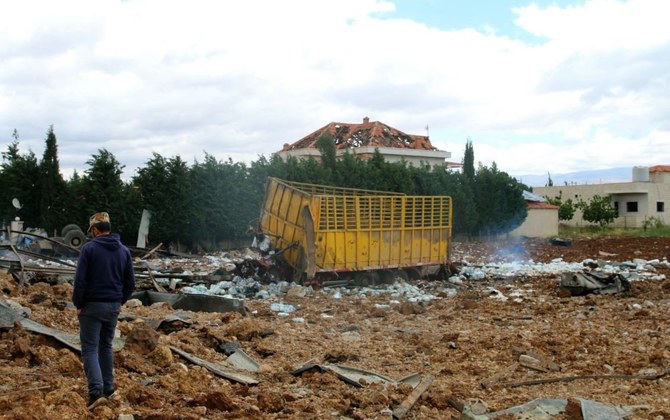
- 2 Israeli soldiers killed in Hezbollah drone attack on Metula area
- Strike was ‘most serious event since the beginning of the war,’ Israeli media report
BEIRUT: Hostilities between Hezbollah and the Israeli army on Lebanon’s southern front escalated on Monday, with two Israeli soldiers killed and several Lebanese civilians injured.
The Israeli army on Monday morning raided what it described as a Hezbollah military compound in Sefri, Baalbek. Three civilians were wounded in the attack, which destroyed a factory, rubble from which covered the neighboring Riyaq–Baalbek road.
Hezbollah, meanwhile, said it targeted the “headquarters of the Golan Division (210th) at the Nafah base with dozens of Katyusha rockets in response to the Israeli attacks in Bekaa.”
It said it also carried out a drone attack that “targeted a gathering of Israeli soldiers south of Metula … (which) hit the Israeli soldiers’ settlement points in addition to destroying and damaging their vehicles and killing and injuring them.”
Israeli media outlets later confirmed that two soldiers had been killed in Metula.
“Targeting Metula is the most serious event since the beginning of the war in northern Israel as two soldiers were killed and two others were injured, with one sustaining serious injury, after a kamikaze drone hit Metula. The victims were soldiers in the 98th Paratroopers Division,” one report said.
Israeli fighter jets conducted eight airstrikes at a low altitude, focusing on the mountains and valleys of Iqlim Al-Tuffah and Jabal Al-Rayhan.
The attacks were concentrated near Al-Tasa Spring, Aqamata farm, the towns of Louaize and Aramti, and areas near Sarda.
Israeli army spokesman Avichay Adraee said warplanes targeted “15 military buildings and infrastructure that were placed inside a camp belonging to Hezbollah’s Radwan Force in the Louaizeh area in southern Lebanon.”
The army also bombed what Adraee described as “military buildings in the towns of Ramia, Aita Al-Shaab and Marwahin and military infrastructure in Jabal Balat.”
The Israeli military said it used artillery to target “the origin of the gunfire in the Shebaa area to eliminate a possible danger.”
The action was taken after observing two rockets being fired from Syrian land toward the town of Ramot Magshimim in the Golan Heights, it said.
“The rockets landed in uninhabited areas and did not cause any injuries,” it said.
Israeli F15 fighter jets also flew at a low altitude over the Marjayoun Plain and Al-Khiam and conducted an attack on Sajjad Heights and Malikh Heights.
Israeli forces also shelled the towns of Kafr Kila and Al-Adisa from Metulla as warplanes flew overhead.
Kuwait, EU discuss cooperation on renewable energy, climate change
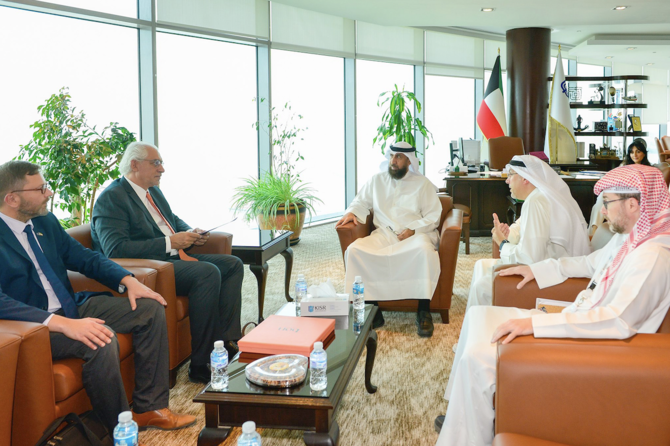
- Two underscored the pivotal role of the private sector in realizing clean energy objectives under international treaties
LONDON: The Kuwait Institute for Scientific Research on Monday held discussions with an EU delegation about enhancing cooperation in renewable energy, climate change and addressing international environmental challenges.
Mashaan Al-Otaibi, acting director-general of KISR, met with Spyros Kouvelis, representing the European Commission’s Gulf Cooperation Council-EU project on green transition.
The two underscored the pivotal role of the private sector in realizing clean energy objectives outlined in international treaties, Kuwait News Agency reported.
Al-Otaibi highlighted Kuwait’s vision of improving the business environment through its green transition project as a means to achieve these objectives.
He said that this was crucial for enabling renewable energy solutions, fostering regional cooperation, and taking strides toward a sustainable future while mitigating the effects of climate change.
In response, the EU official reiterated the significance of bolstering collaboration between international organizations, such as the EU, the UN, and GCC countries through green transition projects.



